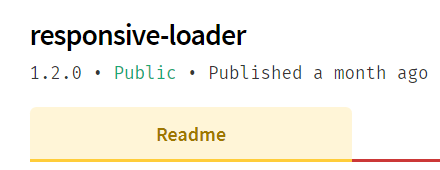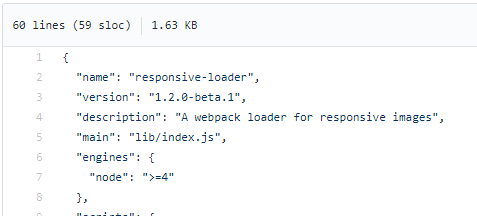A webpack loader for responsive images. Creates multiple images from one source image, and returns a srcset. For more information on how to use srcset, read Responsive Images. Browser support is pretty good.
npm install responsive-loader sharp --save-dev
For super-charged performance and webp and avif formats support, responsive-loader works with sharp. It's recommended to use sharp if you have lots of images to transform.
module.exports = {
// ...
module: {
rules: [
{
test: /\.(png|jpe?g)$/,
use: [
{
loader: 'responsive-loader',
options: {
// Set options for all transforms
},
},
],
type: 'javascript/auto',
},
],
},
}npm install responsive-loader jimp --save-dev
Responsive-loader can be use with jimp to transform images. which needs to be installed alongside responsive-loader. Because jimp is written entirely in JavaScript and doesn't have any native dependencies it will work anywhere. The main drawback is that it's pretty slow.
If you want to use jimp, you need to configure responsive-loader to use its adapter:
module.exports = {
// ...
module: {
rules: [
{
test: /\.(png|jpe?g)$/,
use: [
{
loader: 'responsive-loader',
options: {
+ adapter: require('responsive-loader/jimp')
},
},
],
type: 'javascript/auto',
}
]
},
}//declare a module to your type definitions files *.d.ts
interface ResponsiveImageOutput {
src: string
srcSet: string
placeholder: string | undefined
images: { path: string; width: number; height: number }[]
width: number
height: number
toString: () => string
}
declare module '*!rl' {
const src: ResponsiveImageOutput
export default src
}import responsiveImage from 'img/myImage.jpg?sizes[]=300,sizes[]=600,sizes[]=1024,sizes[]=2048!rl';
import responsiveImageWebp from 'img/myImage.jpg?sizes[]=300,sizes[]=600,sizes[]=1024,sizes[]=2048&format=webp!rl';
...
Then import images in your JavaScript files:
import responsiveImage from 'img/myImage.jpg?sizes[]=300,sizes[]=600,sizes[]=1024,sizes[]=2048';
import responsiveImageWebp from 'img/myImage.jpg?sizes[]=300,sizes[]=600,sizes[]=1024,sizes[]=2048&format=webp';
// Outputs
// responsiveImage.srcSet => '2fefae46cb857bc750fa5e5eed4a0cde-300.jpg 300w,2fefae46cb857bc750fa5e5eed4a0cde-600.jpg 600w,2fefae46cb857bc750fa5e5eed4a0cde-600.jpg 600w ...'
// responsiveImage.images => [{height: 150, path: '2fefae46cb857bc750fa5e5eed4a0cde-300.jpg', width: 300}, {height: 300, path: '2fefae46cb857bc750fa5e5eed4a0cde-600.jpg', width: 600} ...]
// responsiveImage.src => '2fefae46cb857bc750fa5e5eed4a0cde-2048.jpg'
// responsiveImage.toString() => '2fefae46cb857bc750fa5e5eed4a0cde-2048.jpg'
...
<picture>
<source srcSet={responsiveImageWebp.srcSet} type='image/webp' sizes='(min-width: 1024px) 1024px, 100vw'/>
<img
src={responsiveImage.src}
srcSet={responsiveImage.srcSet}
width={responsiveImage.width}
height={responsiveImage.height}
sizes='(min-width: 1024px) 1024px, 100vw'
loading="lazy"
/>
</picture>
...Notes:
widthandheightare intrinsic and are used to avoid layout shift, other techniques involve the use of aspect ratio and padding.sizes, without sizes, the browser assumes the image is always 100vw for any viewport.- A helpful tool to determine proper sizes https://ausi.github.io/respimagelint/
loadingdo not add loading lazy if the image is part of the initial rendering of the page or close to it.srcsetModern browsers will choose the closest best image depending on the pixel density of your screen.- in the example above is your pixel density is
>1xfor a screen>1024pxit will display the 2048 image.
- in the example above is your pixel density is
Or use it in CSS (only the first resized image will be used, if you use multiple sizes):
.myImage {
background: url('myImage.jpg?size=1140');
}
@media (max-width: 480px) {
.myImage {
background: url('myImage.jpg?size=480');
}
}// Outputs placeholder image as a data URI, and three images with 100, 200, and 300px widths
const responsiveImage = require('myImage.jpg?placeholder=true&sizes[]=100,sizes[]=200,sizes[]=300')
// responsiveImage.placeholder => 'data:image/jpeg;base64,/9j/4AAQSkZJRgABAQAAAQABAAD/2wCEAAIBAQE…'
ReactDOM.render(
<div
style={{
height: responsiveImage.height,
width: responsiveImage.width,
backgroundSize: 'cover',
backgroundImage: 'url("' + responsiveImage.placeholder + '")',
}}>
<img src={responsiveImage.src} srcSet={responsiveImage.srcSet} />
</div>,
el
)You can also use JSON5 notation:
<source srcSet={require('./image.jpg?{sizes:[50,100,200,300,400,500,600,700,800], format: "webp"}').srcSet} type='image/webp'/>
| Option | Type | Default | Description |
|---|---|---|---|
name |
string |
[hash]-[width].[ext] |
Filename template for output files. |
outputPath |
string | Function |
undefined |
Configure a custom output path for your file |
publicPath |
string | Function |
undefined |
Configure a custom public path for your file. |
context |
string |
this.options.context |
Custom file context, defaults to webpack.config.js context |
sizes |
array |
original size | Specify all widths you want to use; if a specified size exceeds the original image's width, the latter will be used (i.e. images won't be scaled up). You may also declare a default sizes array in the loader options in your webpack.config.js. |
size |
integer |
original size | Specify one width you want to use; if the specified size exceeds the original image's width, the latter will be used (i.e. images won't be scaled up) |
min |
integer |
As an alternative to manually specifying sizes, you can specify min, max and steps, and the sizes will be generated for you. |
|
max |
integer |
See min above |
|
steps |
integer |
4 |
Configure the number of images generated between min and max (inclusive) |
quality |
integer |
85 |
JPEG and WEBP compression quality |
format |
string |
original format | Either png or jpg; use to convert to another format. webp and avif is also supported, but only by the sharp adapter |
placeholder |
boolean |
false |
A true or false value to specify wether to output a placeholder image as a data URI |
placeholderSize |
integer |
40 |
A number value specifying the width of the placeholder image, if enabled with the option above |
adapter |
Adapter |
JIMP | Specify which adapter to use. Can only be specified in the loader options. |
disable |
boolean |
false |
Disable processing of images by this loader (useful in development). srcSet and other attributes will still be generated but only for the original size. Note that the width and height attributes will both be set to 100 but the image will retain its original dimensions. |
esModule |
boolean |
false |
Use ES modules syntax. |
emitFile |
boolean |
true |
If true, emits a file (writes a file to the filesystem). If false, the loader will still return a object with the public URI but will not emit the file. It is often useful to disable this option for server-side packages. |
cacheDirectory |
string or boolean |
false |
Experimental: If true, this will cache the result object but not the image files. The images are only produced once, when they are not found in the results object cache, or when the options change (cache key). For Development you can set query parameter to ?cacheDirectory=false. |
background: number— Background fill when converting transparent to opaque images. Make sure this is a valid hex number, e.g.0xFFFFFFFF)
background: string— Background fill when converting transparent to opaque images. E.g.#FFFFFFor%23FFFFFFfor webpack > 5format: webp— Conversion to theimage/webpformat. Recognizes thequalityoption.format: avif— Conversion to theimage/avifformat. Recognizes thequalityoption.progressive: boolean- Use progressive (interlace) scan forimage/jpegformat.rotate: number- Rotates image more here
Set a default sizes array, so you don't have to declare them with each require.
module.exports = {
entry: {...},
output: {...},
module: {
rules: [
{
test: /\.(jpe?g|png|webp)$/i,
use: [
{
loader: "responsive-loader",
options: {
adapter: require('responsive-loader/sharp'),
sizes: [320, 640, 960, 1200, 1800, 2400],
placeholder: true,
placeholderSize: 20
},
},
],
}
]
},
}Type: Boolean or string
Default: false
Experimental: If true, this will cache the result object but not the image files. The images are only produced once, when they are not found in the results object cache, or when the options change (cache key). For Development you can set query parameter to individual images by using ?cacheDirectory=false.
Default cache directory might be .node_modules/.cache/responsive-loader
module.exports = {
module: {
rules: [
{
test: /\.(jpe?g|png)$/i,
use: [
{
loader: 'responsive-loader',
options: {
esModule: true,
cacheDirectory: true,
publicPath: '/_next',
name: 'static/media/[name]-[hash:7]-[width].[ext]',
},
},
],
},
],
},
}Type: Boolean
Default: false
By default, responsive-loader generates JS modules that use the CommonJS syntax.
There are some cases in which using ES modules is beneficial, like in the case of module concatenation and tree shaking.
You can enable a ES module syntax using:
webpack.config.js
module.exports = {
module: {
rules: [
{
test: /\.(jpe?g|png)$/i,
use: [
{
loader: 'responsive-loader',
options: {
esModule: true,
},
},
],
},
],
},
}Maybe you want to use another image processing library or you want to change an existing one's behavior. You can write your own adapter with the following signature:
type Adapter = (imagePath: string) => {
metadata: () => Promise<{width: number, height: number}>
resize: (config: {width: number, mime: string, options: Object}) => Promise<{data: Buffer, width: number, height: number}>
}The resize method takes a single argument which has a width, mime and options property (which receives all loader options)
In your webpack config, require your adapter
{
test: /\.(jpe?g|png)$/i,
loader: 'responsive-loader',
options: {
adapter: require('./my-adapter')
foo: 'bar' // will get passed to adapter.resize({width, mime, options: {foo: 'bar}})
}
}- Doesn't support
1x,2xsizes, but you probably don't need it.
- How to use responsive-loader with Pug. Thanks to the awesome pug-loader.
Please submit your own example to add here



